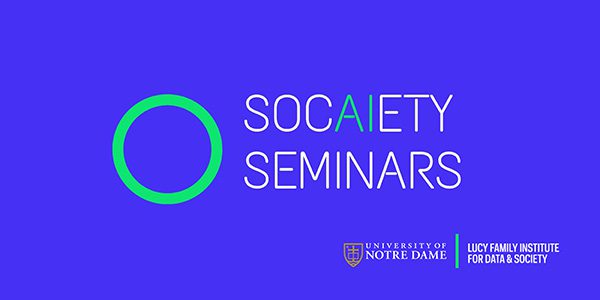Neuroscience and (Your) Behavior – How experiences influence brain function and long-term health
Subscribe to the ThinkND podcast on Apple, Spotify, or Google.
Featured Speakers:
- Elizabeth Archie, Associate Professor of Behavioral Ecology and Disease Ecology, Science University of Notre Dame
- Nancy Michael, Associate Teaching Professor and Director of Undergraduate Studies for Neuroscience and Behavior, Science University of Notre Dame
The second virtual event of the Neuroscience and (your) Behavior series featured a discussion on how childhood stressors can cause negative developmental effects in humans and animals. The talk also highlighted how intervention strategies can lessen this damage to physical and mental health. The event was led by Nancy Michael, Neuroscience and Behavior Associate Teaching Professor and Director of Undergraduate Studies, with special guests Elizabeth Archie, Associate Professor, Biological Sciences, and Kristin Valentino, Director, William J. Shaw Center for Children and Families & William J. Shaw Center for Children and Families Professor of Psychology. The speakers shared how their neuroscientific, psychological, and biological research into childhood adversity seeks to prevent these health detriments to individuals, families, and communities.
In order to better understand and address these developmental effects in humans, one can also examine the behavior of animals. Archie, an evolutionary biologist who leads one of the world’s longest-running studies of a wild primate population, explained the wealth of information and degree of detail provided by her baboon subjects. Juvenile baboon adversities like parental loss, food insecurity, high population density, social isolation, or the birth of a sibling resemble stressors faced by human children. But unlike studying human subjects, Archie discussed how researchers can observe baboons for the entirety of their 20-year life span, which allows them to collect evidence on these experiences’ long-term behavioral and physiological impact. Archie’s work demonstrated the transgenerational nature of adverse childhood experiences, in which a baboon mother’s past and status can negatively affect the quality of life and even survival of her child. Her research showed how not only environmental but also social factors can have profound, long-lasting consequences for baboons’ health, existence, and even gene expression. As Michael pointed out, these results harken back to last week’s theme, emphasizing how relationships neurologically affect one’s experience of the world.
While negative developmental circumstances cause harm for baboons, emotional intervention strategies can help humans cope with similar stressors. Valentino, a clinical and developmental psychologist, described her work with children who have experienced early adversity, abuse, and neglect. As she explained, maltreatment from a parent or caregiver can particularly damage long-term physical and mental health, because the person who should act as a protector against stressors is serving as a source of stress. Fortunately, Valentino’s research shows that interventions, which train parents to talk about emotions with their children, can improve relationships and stress regulation. Valentino emphasized, though, that adverse childhood experiences do not automatically mean that someone will experience negative physical and mental health effects down the road. As this research demonstrates the necessity of supportive relationships in childhood, Michael added that interpersonal connections remain essential to neurological function into adulthood.
Archie’s and Valentino’s studies of young animals and humans not only conveyed how foundational early relationships are across generations, but it also showed that people can overcome adversities if they grow up in less-than-ideal situations. The interconnected, neurodevelopmental effects on physical and mental health depend on the connections between humans themselves, which Michael, Archie, and Valentino illuminated in this week’s ThinkND event.
- Children’s environment and the behavior of caretakers can have long-term impacts on not only their mental but also their physical health, especially the ways they manage stress (2:47)
- While baboons’ experiences do not exactly mirror human stressors, studying them can illuminate very similar adversities and responses to human society (17:16)
- Emotional interventions can teach parents how to talk with their children about their feelings, which causes positive, long-term neurodevelopmental changes in individuals and across generations (51:40)
- “We understand that really adverse environmental experiences like maltreatment can have effects on the brain, neurobiology, and development. We usually think about those in negative ways. I think it’s also really exciting to realize that changing our environments for the better can also change our neurobiology for the better” (Kristin Valentino, 6:04)
- “Parents are really in charge of helping to develop kids’ stress regulation systems and their emotion regulation systems” (Kristin Valentino, 22:29)
Related Content
Reunion 2024
Alumni Education Programming Click each program title to learn more. ND Perspectives: Election 2024 and the Future of Democracy in the U.S. The 2024 presidential election looms...
Read ArticleA Brave New World of AI Governance
Explore the connection between data, geopolitics and governance, regulation, self-regulation while discovering examples of good and bad practices in various sectors, such as...
View EventAlgorethics: potentiality and challenges in the age of AI
Explore the possibilities and challenges in ethical governance of AI through algorethics. Algorethics is a term that has been developed since 2018 to denote the need for a study...
View Event

